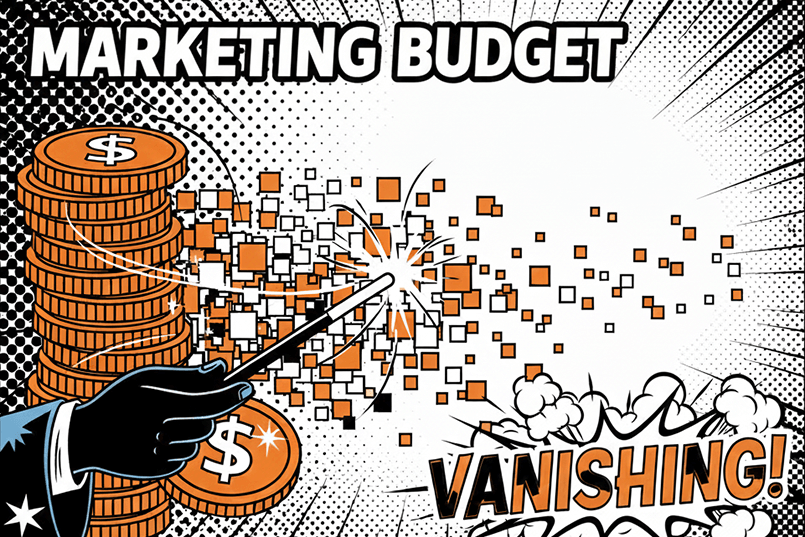With the increase in the cost of living still impacting households in most of the world’s economies, it only stands to reason that businesses will be equally impacted as consumers tighten their belts.
In the last few months, we have already seen significant adland redundancies as marketers cut back activity in the face of dwindling budgets. And once again, those who remain at advertising’s “coalface” will be asked to do more with less.
Whilst agency fees are only a small percentage of your total advertising spend, how can marketers ensure every dollar spent on agency fees works harder and with less waste? Here are five key principles to master.
Developing a comprehensive and detailed Scope of Work
Number 1 on the list is developing a comprehensive and detailed Scope of Work—i.e., what exactly you want your agency to do.
A laundry list of campaigns you want the agency to work on, perhaps lifted directly from your annual marketing plan, is not a Scope of Work. You would not tell the builder of your house you want “six rooms” and expect them to get on with it – you obviously need to detail dimensions, materials, finishings, and so on. The same is true with your agency’s Scope of Work. You need to state the agency’s expected contribution to setting the strategy, whether you want new creative concepts or a refresh of an existing idea, and the volume and type of assets and executions you need produced for which media channels.
For media agencies, the Scope of Work is more a “Scope of Services” – but the principle remains: what do you want them to do, and in what quantities? This is largely driven by the number of campaigns you want them to plan and buy, and the amount of investment in each channel.
The more ambiguity in your Scope of Work and the more the agency has to make assumptions, the more expensive and more waste there is likely to be through multiple iterations, re-work, and “over quoting” to insulate against the lack of detail.
If you don’t know where to begin putting together a Scope of Work, what you had the agency deliver last year is usually a good place to start.
Agreeing to a fair and appropriate fee
Once the Scope of Work is defined, number two is agreeing to a fair and appropriate fee. It sounds obvious, but you’d be surprised at the number of advertisers who negotiate just an hourly rate card and think “job done,” ignoring or forgetting that there are other factors to consider.
And, of course, there’s more than one way to pay the agency: annual retainers; FTE hourly rates; fixed price outputs; service fee or commissions, to name just a handful. But whatever remuneration model you choose (and there are enough articles on the TrinityP3 website about remuneration models to keep you entertained all afternoon) there are a couple of things to keep in mind:
- The fee needs to reflect the value your organisation places on the services.
Not all services are created equally. “Value” is the benefit a buyer derives – real or perceived – from the purchase of a good or service. The services and deliverables that are valuable to one advertiser may be inconsequential to another. Some will be of high importance to your marketing programme and business objectives and therefore of high value, some will be of low importance and low value.
The lion’s share of the fee you pay the agency needs to go to the “high value” services and deliverables – and it’s okay to pay a premium if the benefit you receive is also high. Conversely, don’t pay a premium price for lower-value services – that is not the best way to make your advertising dollars go further.
- However, the fee also needs to be fair for the agency. The agency fee is an easy target when looking to reduce marketing costs. But agencies are businesses too, trying to balance the same tightrope of revenue versus cost that you are, to remain profitable.
Common sense dictates that when their revenue goes down (the fee you pay them), they’ll look at ways to reduce costs: using less experienced (cheaper) labour or cutting corners on the process. Unless you also reduce the scope of work, reducing the agency fee almost always leads to sub-standard work and outcomes – cheaper is not always better.
What is included and excluded in the fee you’ve just agreed
Related to Scope of Work, number 3 is to be explicit about what is included and excluded in the fee you’ve just agreed. Agencies will often charge additional fees for the use of technology utilised in delivering the services, 3rd party data and research costs, and many other items. Perhaps these costs were once absorbed into their base fees, but increasingly that’s no longer the case and can lead to nasty surprises after the contract is signed and the first invoice is received.
Be clear about all these things up front: what is included in base fees and what is not. If not included, are they optional “nice to have” items, or necessary to fulfil the requirements of the Scope of Work – and therefore material extra costs. All too often we hear about marketers having to fork out significant, unbudgeted amounts for service “adjacent” items (usually technology and data) they assumed was included and now can’t avoid paying for.
Ensure you clearly define success.
Defining success comes in at number 4. It staggers me the number of times we review an apparently broken agency / advertiser relationship to discover the root cause is because of a disconnect between the agency’s understanding of what success looks like and the marketer’s vision of success. Often because the agency assumes. Always because of poor communication. And worse still, sometimes because the advertiser’s internal silos and departments aren’t aligned!
So the agency is off in one direction, the marketing team in another, and the C-Suite on a different tangent entirely. Even when the Scope of Work is properly detailed, if the agency is delivering it in a manner at odds with the goals and objectives of the organisation the result is the same: multiple iterations and re-work leading to either higher agency fees, or (more likely), sub-standard service and outcomes – i.e., more waste.
Make sure the agency is regularly and fully abreast of the key metrics utilised in assessing its performance—even if there is no “formal” review mechanism or bonus fee structure in place. Confirm first, of course, that this is the agreed definition of success organisation-wide.
Get the help you need when you need it.
And number 5: get help. Advertiser/agency remuneration might seem simple, but hopefully, the first four principles in this list demonstrate that when done well, it can be a multifaceted and nuanced undertaking—often more “art” than “science.”
Marketers often feel obliged to lead pitches or agency fee negotiations because it is an expected or inferred part of their job description – but these are specialist skills that not all marketers can learn to a high level during their careers. Don’t be afraid to ask for help: lean on internal procurement and commercial functions or seek external assistance; the additional investment will pay dividends in ensuring the fees you pay your agencies are fit-for-purpose and helping drive the business outcomes your organisation seeks.
Contact us for a confidential discussion on any commercial areas you are challenged, such as setting agency fees and getting value for money.
You can read more on how we can help you remove waste from your agency commercial arrangements here.




